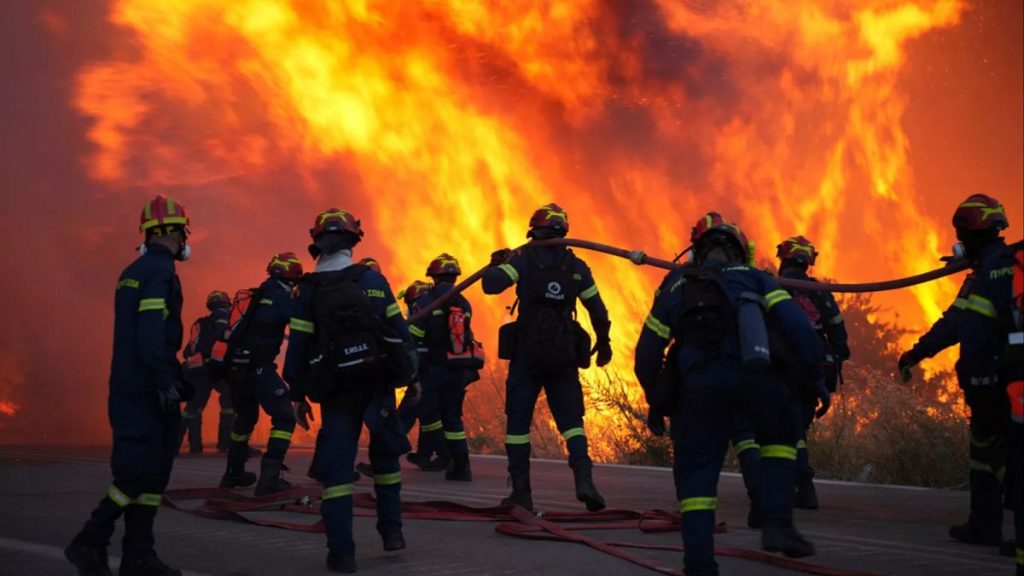On the Greek island of Chios, emergency responders are grappling with a significant wildfire that has persisted for two days, prompting authorities to issue multiple evacuation orders. Over 190 firefighters, along with aerial support, are working to contain the flames while safeguarding residential areas and vital mastiha production zones. The fire’s severity has led to disruptions in power and water supplies, placing immense strain on local communities and prompting a government response to bolster firefighting efforts.
| Article Subheadings |
|---|
| 1) Overview of the Wildfire Situation |
| 2) Emergency Response and Resources Deployed |
| 3) Community Impact and Evacuations |
| 4) Causes and Historical Context of Wildfires in Greece |
| 5) Government Measures and Future Preparedness |
Overview of the Wildfire Situation
The wildfire on Chios has erupted into a formidable challenge for local authorities and firefighters. Initially breaking out on Sunday around noon, the blaze has been exacerbated by strong winds that have hindered firefighting operations. Fire departments reported that multiple blazes emerged simultaneously, leading to a rapid escalation of the situation. With 190 firefighters on the ground, containment efforts are focused primarily on protecting residential areas from encroaching flames while also addressing regions crucial for mastiha production, a local economic staple.
Emergency Response and Resources Deployed
In response to the escalating wildfire, the Greek government has mobilized substantial resources. Firefighters from across the country have been airlifted to Chios, and ground support consists of 35 firefighting vehicles, five helicopters, and two water-dropping planes. Keeping the flames in check is imperative not only for public safety but also to safeguard valuable agricultural resources. Authorities have contacted a specialist fire department arson investigation team to find the cause of the fire, emphasizing the seriousness of the situation.
Community Impact and Evacuations
The impact on local communities has been profound. As flames threaten to reach populated areas, emergency services have issued evacuation orders affecting 16 villages and neighborhoods near Chios town. Mobile push alerts have urged residents to evacuate as the situation remains precarious. Power outages have further complicated challenges, disrupting daily life for many residents while also hindering firefighting operations. Local media reports indicate detrimental effects on water supplies, adding to the urgency of the firefighting mission.
Causes and Historical Context of Wildfires in Greece
Greece is no stranger to wildfires, especially during the scorching summer months. Experts increasingly attribute the rise in frequency and intensity of these blazes to climate change, which has introduced harsher weather conditions. This year’s wildfire on Chios represents a continuation of historical patterns, reminiscent of the devastating Mati fire in 2018 where over 100 lives were lost. That tragedy highlighted the need for better prepared communities and rapid emergency responses, underscoring the importance of this incident on Chios.
Government Measures and Future Preparedness
Anticipating the growing risks posed by wildfires, the Greek government has taken proactive measures in recent months. This includes deploying a record number of permanent and seasonal firefighters, with about 18,000 personnel supported by thousands of volunteers. Additionally, nearly doubling the drone fleet has been proposed to enhance emergency response capabilities. These efforts indicate a commitment to addressing the challenges posed by increasingly frequent wildfires and highlight the importance of community safety and resilience.
| No. | Key Points |
|---|---|
| 1 | A major wildfire on the Greek island of Chios has prompted widespread evacuations as local authorities battle the flames. |
| 2 | Emergency services are utilizing significant resources, including aerial support and personnel reinforcements from other regions. |
| 3 | Evacuation orders have affected 16 villages and neighborhoods, leading to disruptions in power and water supplies. |
| 4 | Greece has a long history of wildfires, increasingly aggravated by climate change, which poses significant risks to communities. |
| 5 | The government is proactively increasing firefighter numbers and resources to bolster future preparedness for wildfire risks. |
Summary
The wildfire situation on Chios exemplifies the growing challenges posed by climate change and the necessity for robust emergency response strategies. With multiple evacuations and significant community impacts, the firefighting efforts underscore the vital need for collaboration and preparedness at all levels of government. The incidents of Chios serve as a grim reminder of the historical context in which Greece operates, highlighting the importance of evolving strategies to combat wildfires effectively.
Frequently Asked Questions
Question: What are the primary challenges firefighters face in controlling wildfires?
Firefighters commonly encounter strong winds, difficult terrains, and limited access to water supplies, making it challenging to contain the fires.
Question: How does climate change affect wildfire risks?
Climate change leads to hotter temperatures and drier conditions, which increase the frequency and intensity of wildfires, making them more destructive.
Question: What can communities do to prepare for potential wildfires?
Communities can enhance fire preparedness through emergency response plans, community drills, and by maintaining defensible spaces around properties.


